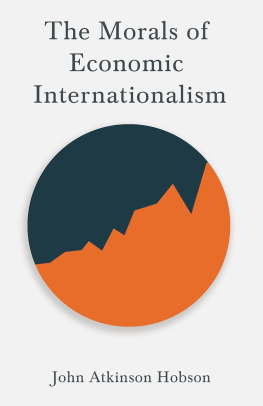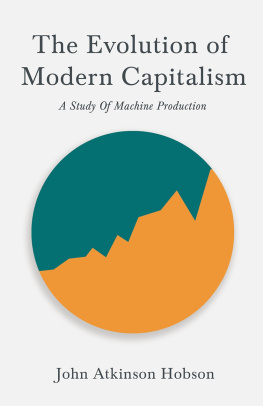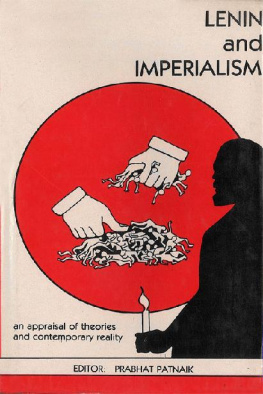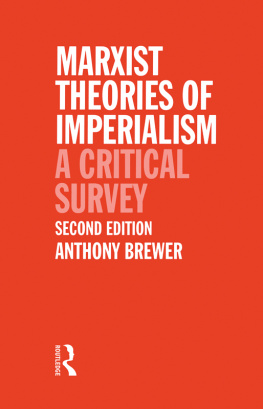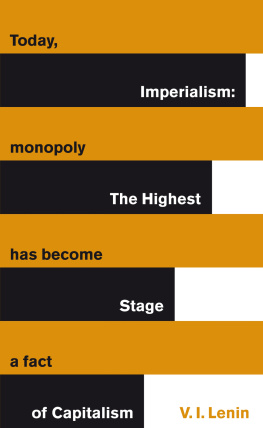Routledge Revivals
Theories of Imperialism
First published in 1984, this study examines closely the shifting attitudes towards, and theories concerning, imperialism, from the colonial wars of the late nineteenth century to Americas involvement in Vietnam. This lucid investigation encompasses the World Wars, the disintegration of the Colonies and the Cold War. It also gives fascinating insight into the theories of imperialism advocated by such diverse writers as Hobson, Wilshire, Angell, Brailsford, Luxemberg and Lenin. Throughout, the author objectively evaluates the theory that capitalism is a cause of aggression a fundamental tenet of anti-imperialist writers. It is Norman Etheringtons contention that further investigations into the sources, causes and effects of imperialism can only take place if the various theories concerning it are analysed. A fascinating and detailed study, this reissue will be of particular value to students interested in the theories and history of imperialism.
First published in 1984
by Croom Helm Ltd
This edition first published in 2014 by Routledge
2 Park Square, Milton Park, Abingdon, Oxon, OX14 4RN
and by Routledge
711 Third Avenue, New York, NY 10017
Routledge is an imprint of the Taylor & Francis Group, an informa business
1984 Norman Etherington
The right of Norman Etherington to be identified as author of this work has been asserted by him in accordance with sections 77 and 78 of the Copyright, Designs and Patents Act 1988.
All rights reserved. No part of this book may be reprinted or reproduced or utilised in any form or by any electronic, mechanical, or other means, now known or hereafter invented, including photocopying and recording, or in any information storage or retrieval system, without permission in writing from the publishers.
Publishers Note
The publisher has gone to great lengths to ensure the quality of this reprint but points out that some imperfections in the original copies may be apparent.
Disclaimer
The publisher has made every effort to trace copyright holders and welcomes correspondence from those they have been unable to contact.
A Library of Congress record exists under LC control number: 83021381
ISBN 13: 978-1-138-79607-2 (hbk)
ISBN 13: 978-1-315-75807-7 (ebk)
for Peggy
1984 Norman Etherington
Croom Helm Ltd, Provident House, Burrell Row,
Beckenham, Kent BR3 1AT
Croom Helm Australia Pty Ltd, 28 Kembla St.,
Fyshwick, ACT 2609, Australia
British Library Cataloguing in Publication Data
Etherington, Norman
Theories of imperialism: war, conquest and capital
1. Imperialism
I. Title
325.32 JC359
ISBN 0-7099-0927-6
First published in the USA 1984 by
Barnes and Noble Books
81 Adams Drive
Totowa, New Jersey, 07512
Library of Congress Cataloging in Publication Data
Etherington, Norman.
Theories of imperialism
1. Imperialism-History. I. Title.
JC359.E83 19:4 32532 83-21381
ISBN 0-389-20444-7
Printed and bound in Great Britain
CONTENTS
The best way to explain my purposes and acknowledge my debts is to explain how I came to write this book. It is the result of an unexpected conjuncture of teaching and research interests. As a teacher of British and African history in the early nineteen seventies, I was becoming increasingly dissatisfied with the way the classic theories of imperialism had been applied to the historical study of European colonial empires. Like many of my colleagues, I kept in my filing cabinet a little series of lectures on the Scramble for Africa which never failed to please students. In the first lecture I would expound the theories of imperialism. In the next two lectures I would look at the facts about the partition of Africa. A final lecture pointed up the manifold ways in which the theories failed to fit the facts. To reinforce the lesson, I required the students to read any one of several anthologies of readings on imperialism specially designed for undergraduates. My growing dissatisfaction with this popular section of my courses on Africa and empire stemmed from the preparation I did before lecturing each year. I went beyond the assigned readings and read in their entirety the works which were selectively quoted in the anthologies. The works of Lenin, Hobson and Schumpeter which were emphasised in these books said surprisingly little about the partition of Africa and other important episodes in the expansion of nineteenth-century colonial empires. The germ of the idea that the first theories of imperialism were not intended to account for the growth of those empires began to sprout when I read an elegant article by Eric Stokes which expressed similar doubts.1
Stokes limited his attention to the central European and Bolshevik theorists Hilferding, Lenin and Bukharin. He did not explain why or how historians had come to misread the socialist theorists. A possible explanation was suggested to me by an apparently unrelated research project I had been carrying on in a desultory fashion for several years. As an undergraduate student I had written a rambling, highly unoriginal honours thesis about British socialists attitudes to the Boer War. In the course of that work I had come across a few passages in the journal of the Social-Democratic Federation which vaguely anticipated later socialist critiques of colonialism. Eight years later I followed up that lead in later volumes of the journal2. By 1902 British socialists were citing Comrade Wilshire in America as the leading expert on the connection between capitalism and imperialism. The name Wilshire was unfamiliar to me except as a boulevard in Los Angeles. I decided to track him down in 1974 on my sabbatical leave in London. I discovered that not only were the originator of the boulevard and the socialist comrade one and the same person, but also that Wilshire had written in 1900 a brief account of surplus capital as a factor promoting armed rivalry among nations. His argument was so similar to that put forward by Lenin in 1916, that I suspected some direct connection between them. This research languished, however, after my return to Australia where I pursued my studies of southern Africa. In 1977, my colleague F.S. Zuckerman pushed me into attending a conference I did not wish to attend and giving a paper on Lenins precursor Wilshire. This moved me to search for the missing link between them. The conclusion of my search was that there was no personal connection. The explanation for the similarity between their theories of imperialism lay elsewhere.
Rereading my copies of Wilshires Magazine, I found that the American socialist had drawn his argument from financial journals published in his own country. Reading the Notebooks which Lenin compiled in his research for Imperialism, the Highest Stage of Capitalism, revealed that he too made copious use of capitalist sources. Could it be that the precursor of every socialist theory of imperialism was a capitalist theory expounded in obscure journals of financial and economic opinion? England suggested itself as a test case. Selective reading of the journals which J.A. Hobson knew as a working economist would show whether he was similarly influenced. The test was positive. It also closed the circle of my initial research. There in Hobsons celebrated work, which I had read two or three times before, was a clear reference to Wilshire and his work on imperialism. Every previous researcher had passed it over because Wilshire was unknown and Hobsons footnote unhelpful. By this time, I was ready to present a preliminary public statement of my conclusions, i.e. the reason that it was wrong to apply the classic theories of imperialism to nineteenth-century empire-building was that these theories had their ultimate origin in policy recommendations made by capitalists at the turn of the century. The slogan which seemed to best express my message at the time was, theories of imperialism were intended to predict the future, not to explain the past.




